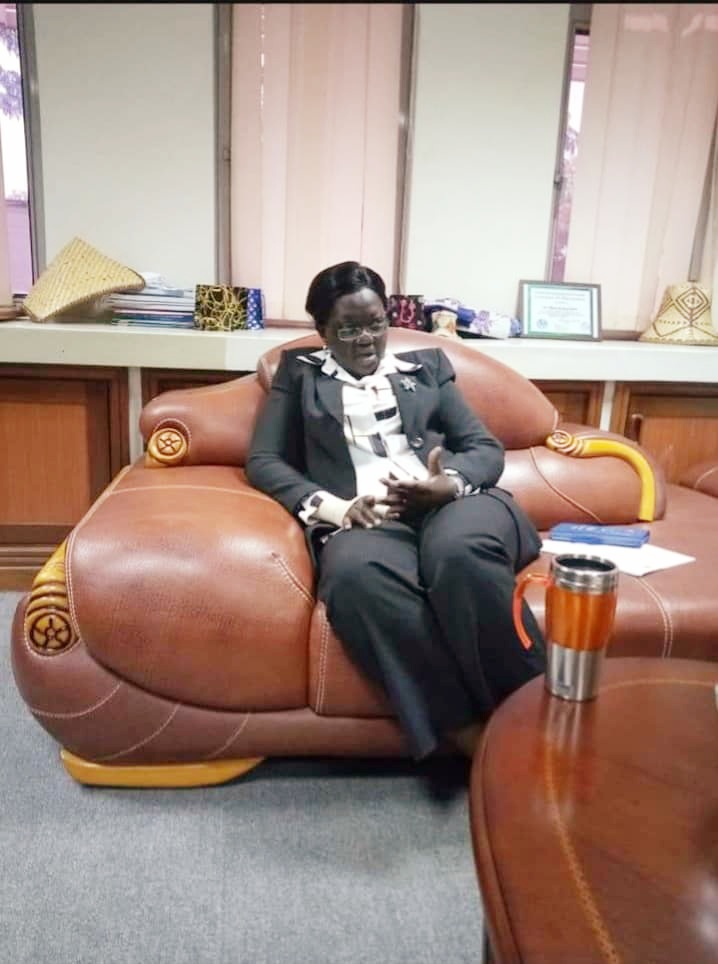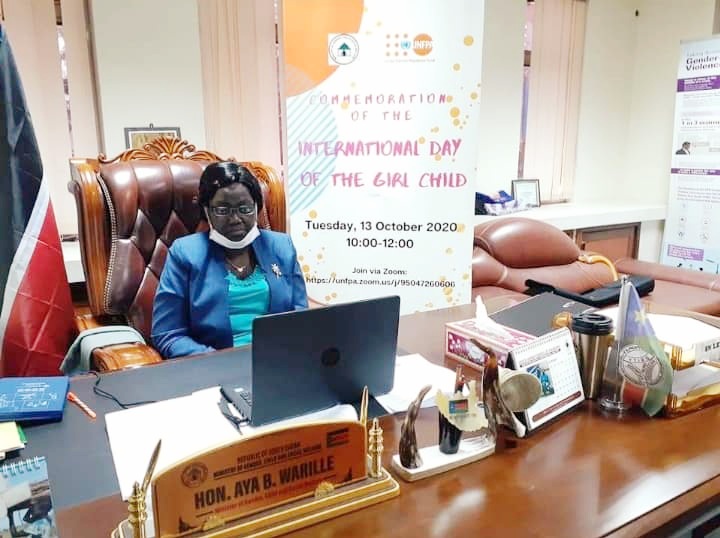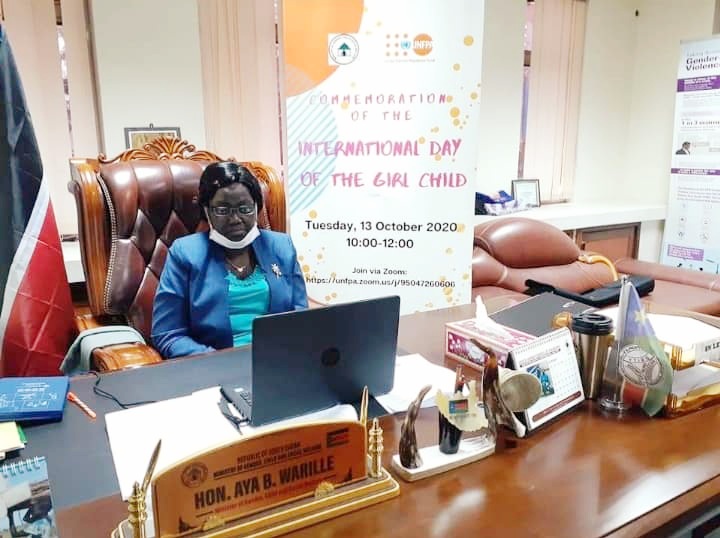I must confess: I never liked politics. My dad was a politician and I remember, in 1986, how they came and arrested him in Juba, here, and every time we went to see him, every Sunday- when we go on Sundays, they would bring somebody who spoke our language to be around. And then baba had to limit his words and be very selective. And I would spend the whole time crying. He stayed in the prison and after, he was taken.


Aggrey Ezbon Idri, member of the rebel SPLM-I/O and former MD of the state’s Nile Commercial Bank, has become the poster boy for those disappeared during the current civil war, but decades before him, his widow witnessed the toll on the family from multiple arrests of her father, a journalist and politician. idri is presumed dead. ROSE KEJI interviews the widow, AYA BENJAMIN WARILLE, the minister of Gender, Child, and Social Welfare, who was catapulted into politics after the loss, about her life and her work. Aya, a graduate of Animal Production (Bsc, University of Juba; MSc, Aberdeen), once the MD of NCB’s sister state company, Nile Comfort Inn, puts her achievements to growing up in a family where both parents had formal jobs.
ROSE KEJI
ROSE KEJI
Reporting for these series is funded by the Norwegian People’s Aid (NPAID) through the Female Journalists Network (FJN) as part of a project to bring women’s voices to the fore. Badru Mulumba is the project editor
KEJI: You are a widow. You have a son. How did you manage to come to where you are – a minister?
AYA BENJAMIN WARILLE: My father was a journalist – a graduate of the University of Khartoum and my mother was a nurse and later became a medical assistant. Both of them valued education so much.
For this position, which is my first position as a politician, I don’t know whether it is fortunate or unfortunate, but it came at a time when I’m already a widow and my only son – the young adult – is already schooling somewhere. So I don’t really have a baby or small child in the house but, like any African, South Sudanese, society, I still have people who I call my children. It is a big challenge because, with the kind of the work we do, you do a lot of reading. I need to familiarize myself with the documents, the policies in the ministry. I meet people. And remember we are also doing party work. So, you have less time to give give to the children. But I’m managing because, at least they know my schedule. And they know that, especially weekends, I give enough time to attend to the needs of my family, the needs of the surroundings – the compound is clean, garbage is taken, shopping is done. Making sure that there’s water, the sewage is emptied. The fridge, you buy some food and stock. I’m not saying am the best, but I’m managing well. So far I don’t have much complaints.
I come from a community [Mundri] where, if there is death, people gather. They put the dead body there and you are supposed to be seated there until the person is buried. You join the other women in serving that one I have neglected it for some time now. I can’t afford to sit in one place for the whole day. I make calls. I go briefly. But I assure people that I’m with them.
Q. What do you like most in your life?
AYA: I used to like singing, listening to music, and dancing. Then knitting. But now, as I grow older – you want to knit, you have to put on your glasses. That one has reduced a bit. But I like making friends. When I get into a new environment, I want to know who is around me and it is something that I enjoy so much.
In a home environment, I like organizing the house. I would have issues with my husband – may his soul rest in peace. He goes out, by the time he comes back I have already moved this one. He would have difficulty finding out his personal things. I think that is me. I like organizing, reorganizing my house, my kitchen, my office.
LITTLE LOVE FOR POLITICS
Q. What inspired you to become a politician?
AYA: I must confess I never liked politics. My dad was a politician and I remember, in 1986, how they came and arrested him in Juba, here, and every time we went to see him, every Sunday- when we go on Sundays, they would bring somebody who spoke our language to be around. And then baba had to limit his words and be very selective. And I would spend the whole time crying. He stayed in the prison and after, he was taken. Their party took him to Khartoum. And that was a blessing, anyway, because that is what opened ways for us to go to Khartoum and study. So, that experience was bad. And again, after, in Khartoum, he was also arrested and I saw it. I did not like it.
What inspired me is the trust people have in me. During and after the 2013 crisis, I was in Nairobi because I was unwell. 2012, I went to Nairobi. So that incident happened when I was in in Nairobi. I interacted with people. They saw the leadership in me – because I was leading all the groups that were there. The fact that people trust me that has inspired me and it keeps me going. And I’m very passionate – to be honest- about women and children activities and it’s an honor, though not planed, to be in this Ministry – a ministry that is connected and that is in touch with people because that is what makes a nation – the human beings that we are dealing with. So, I don’t want to let down the people who trust me. So this keeps on inspiring me every now and then and it keeps me going
Q. Who is your role model?
AYA: My mother is my role model. She is my mother, she is my friend, she is my strength, and she is my Inspiration. As I mentioned earlier, I am the second born, but the first girl. When I was born, my mother was doing nothing. So she completed her nursing, but even then she was taking care of my siblings, breastfeeding them, she was managing her home, she was taking care of my dad. She would go to school, she would work and help us to study. She used to be our teacher when we were young: do home work with us and prepare us for exams.
She has shown me, right from child hood that I could be what I wanted to. She believed in all of us. She never discriminated against the daughters so we had opportunities – whether you are a boy or a girl you had the same opportunity.
She valued education so much. And that is what was common between her and father. And they invested heavily in us. They took us to one of the best schools – I went to a sister school in Khartoum. For them, education was a priority. I am happy because all of us – brothers and sisters – all of us went to the University. And I thank God because God blessed us also, because everybody got married and is settled. And I think that is a blessing. And to me, I always look up to her. It is her that I trust, it is her that I go to for strength, even at my worst times, and I still go to her.
Q. What are the challenges that you have been facing as a minister of Gender. There are a lot of cases of GBV, cases facing women and children?
AYA: This government is a bit different in the sense that the mandate is to implement the peace Agreement and remember we have come by appointment. So different parties. Again in the appointment there is a quota for women and it is that ticket that has brought me – 35 percent affirmative action. I might be very lucky because for some people the ministry of Gender and Social Welfare is a women ministry, so it is less important and may be less competition because when something is not [considered] important, there’s less competition. But some people would have loved to still be seated on this seat.
The other challenge is that I Joined politics and immediately became a Minister because my story is a bit different. My husband was a politician. When he was declared dead after his disappearance and I became a widow and they saw that I could handle it, they gave it to me. And I value it so much. I want to do the best the way my husband would have done.
But, as I said earlier, this ministry, they consider it less important. It has a huge mandate of mainstreaming gender, mandate of social justice, mandate to promote and protect the rights of women, children, persons with disability, and other vulnerable groups. If you look at this, it covers the whole society. So the challenge is: less budget allocated for the ministry and as such we can’t carry out activities the way we should. And this is the main problem here. As such, we don’t have facilities. We are accommodated in the ministry of health. Since creation. I saw the office there being constructed halfway, and it has been there for long. We even don’t have vehicles. The staff that are here – you invest – you have the opportunity to train them, but then they get better jobs and they leave. So we have issues of staffing. I know it is not only this ministry. It is across the ministries. But here I think is worse because of the issue of funding.
Q. What have been your achievements as a minister?
AYA: I came at a very difficult time. During the Swearing-in was when, officially, the president closed schools. So, it is like we came with corona [COVID19]. When we came, all activities were geared towards corona. And with COVID19, when schools closed, girls are home: there is a lot of domestic violence, there is a lot of unwanted pregnancy, a lot of rape. That was the first thing that we started having. Many, many cases of GBV. I am happy because with the support of the national NGOs, we took the lead as a ministry. GBV has always been there, but with COVID19 – COVID made it worse. So, we were able to take the lead in trying to address this issue.
Remember, we stayed for over a year without a state government. So, it’s unfortunate that we could not reach out to most of those states because there was no ministry. But towns like Juba benefited from this service.
We have put a bit of efforts – joining other stakeholders in awareness creation about GBV, awareness creation about even COVID19. We also participated in distributing food to the most needy and we also contributed when people had the natural disaster of floods, of locusts. We also took part in that.
But in the ministry, there are a number of documents that are internal – I am happy when they were launching this report of the Security Council Resolution 1325 on women, peace and security and the new national action plan. I am happy that we have reached there. Yesterday, I we were able — the first time — to bring in all the state ministers and orient them on all the policy documents and frameworks that we have and equip them, of course, on how – we agreed on the modalities of how we can stay in touch, coordinate our activities, and report, And I am impressed because we achieved our objectives.
Q. How do you balance between home activities and work?
AYA: That one is what I said earlier. My family is not demanding so much. So that gives me space, it gives me freedom to put so much of my time into work because I need to study what is happening on top of everything.
Q. What kind of skills supported you to become who you are now?
AYA: I am a first learner. So I think I’m trainable. I would get into something and get into a situation and start learning my environment very first. I think that has helped me so much because I was able to adjust to this situation and do the best I can. And I believe that everything happens for a reason. You are in place for a reason and you have to live the purpose. So I do everything that I can do to make it work.
Q. Your advice to women
AYA: It is very encouraging when someone comes to my office – and I have a number of them – they would come, we talk. And when there are things, somebody would whisper to you and say, I admire you; you inspire me. Those words are encouraging. I would say that all of us, at some point in life, are mentored. So you look up to somebody and allow – you know mentorship is a two way thing: the mentor and the mentee. So somebody has to give you the knowledge or the skills or the qualities that you need and you have to accept it or be in position to take it. To anybody out there who is looking up to be like me, you allow yourself to be mentored.
The other thing is believing in yourself. It is very, very important. Sometimes, we doubt everything about ourselves. We kind of have negative thoughts and feelings about ourselves and I do not blame you. May be something is happening that puts you down, but there is always a second chance. So believe in yourself, continue doing what you believe is right and do it to the best of your ability.
If I can come from where I was, and be in this office now, you are just like me. There is nothing special. You can also make it. I want to say that whether you are in the state, or you are in Juba, the capital, of course, there is a state ministry here, have time to go the nearest ministry and get to know the policies that we have in the ministries so that you can understand. There are so many documents that protect you women. So, get to know these documents so that you can claim your rights -he right of you being a women and the right of you being anywhere you want to be just, like any other human being. I believe we can change this country to what we want it to be. But then we have to take the front sit, we have to be proactive, we have to be there, ready to move things forward.
We can build ourselves, if we choose to. So, I am encouraging us to build our selves. Hold your sisters’ hand, pull her up, not pushing.. In this we share everything that we have and nobody will be left behind. I encourage all the women – it does not matter which stage you’re – it does not matter your educational background, your political affiliation, your religion, your color, but the fact that you’re a woman that is enough to make us one – let us unite and move our agenda forward.
The last one is about peace. Let us be part of building this peace. At this stage, we need peace. Women, we need peace more than any other person because if something happens, it is us to suffer. When there is cattle raiding, we are taken with the cattle. When there is chaos, we are the ones raped, our children are killed. And even these men are our brothers, they are our uncles. So let us be active in peace building. Let’s make sure that we are peaceful in our families, in our communities, so that we can move this country ahead and our children will grow up in a better environment.




